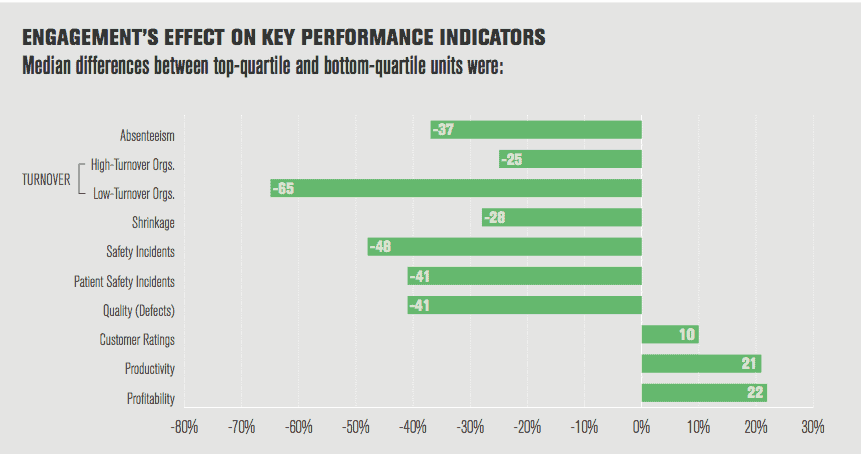What is the key to a successful performance management process?
While that's not the most exciting question someone may ask. It's a important and expensive one.
According to Gallup, "the cost of poor management and lost productivity from employees in the U.S. who are not engaged or actively disengaged [is] between $960 billion and $1.2 trillion per year."
In Gallup's latest study, Re-engineering Performance Management, they bring their usual data-driven, thoughtful approach to another key area of great leadership, management, and engagement.
As we have done for past studies like the State of the American Workplace, and the State of the American Manager, we've got some key takeaways for you to consider. If you find them helpful, consider also downloading the full report here.
Key Takeaways from Gallup's Re-engineering Performance Management
In this report, Gallup has the performance review square in its sights. And with good reason.
In addition to the previously mentioned massive cost of disengagement, reviews are costing companies greatly as well. The cost of having a poor performance management process via reviews can cost between, "$2.4 million to $35 million per year for a company with 10,000 employees."
This is in line with what Adobe reported when they got rid of their performance reviews; they found they were spending over 2 million hours a year on them. The waste and cost adds up fast.
1) "Only 14% of employees strongly agree that the performance reviews they receive inspire them to improve.”
Gallup has a series of stats that all show a common theme we've seen many talk about before: performance reviews aren't working. Here are two of the most telling.
For starters, reviews are not viewed as fair, nor accurate. According to Gallup:
"29% of employees strongly agree that the performance reviews they receive are fair, and 26% strongly agree they are accurate."
And most don't believe it helps them improve, either:
"Only 14% of employees strongly agree that the performance reviews they receive inspire them to improve.”
If reviews are not reflective of true performance, and they don't help people improve, that's a pretty strong indictment on their value. All that's left is using them to determine compensation and promotions, which may be flawed as well, but necessary.
The problem with "Strongly Agree."
Before we dive too deep into the many issues with reviews that Gallup summarizes well, it's worth looking at the one, pervasive flaw in this report: reliance on "Strongly Agree."
Almost every stat that Gallup highlights in this study is based on the percentage of those they surveyed that chose "Strongly Agree." This is one of the 5 choices they allow to their questions: Strongly Agree, Agree, Neutral, Disagree, Strongly Disagree
That means with random selection you'd get 20% (because it's 1 in 5), but then they make stats of 20-30% seem alarming. How many things in life do you "strongly agree" with?
I believe it would be much more relevant and helpful if they also shared their stats to include how many chose "agree" to these statement.
As you look at the rest of the stats we share, keep in mind that they're essentially filtering for only the most enthusiastic agreements. If you want the kinds of results they discuss, realize that's the bar you have to aim for. "Pretty good" won't be enough to have your people "Strongly Agree."
2) Reviews are biased & broken.
The performance management process of evaluating employees every 6-12 months is quite common around the world. Yet, it's plagued by problems.
As our past dives into performance reviews show, there are many issues with reviews. Whether you're talking about inherent biases based on the person completing the review, the toxic problems of stack ranking, or the pain of getting all your feedback just once a year, it's problematic to say the least.
In particular, Gallup breaks down a series of the biases affecting this common performance management process in a clear, concise way (see Appendix A in their report). Here's a few of them:
- Personal or idiosyncratic bias: Managers are more likely to see the good in employees whom they like and who do things the way the manager would do them.
- Central tendency: Managers have a natural tendency to give most people an "average” or "satisfactory” rating because they struggle to distinguish performance among workers.
- Spillover effect: Employees who were good performers in the past are more likely to be rated favorably in the future.
These biases, and the other common problems, are what have made reviews the pariah they are today.
While some are going to the extreme of getting rid of them entirely, you don't have to go that far. Knowledge is power and being aware of the problems can help you work on them. The rest of Gallup's report focuses on what you need to do to improve the performance management process.
The answer may surprise you.
Further Reading:
- Read our most comprehensive look at the good, the bad, and the ugly of performance reviews.
- Here's why Adobe, GE, Deloitte, and others have gotten rid of performance reviews and replaced them with 1 on 1s.
- Want to keep your reviews? Here's some ideas to improve them.
3) You need coaches, not managers.
The central idea of Gallup's report is that what happens between reviews is what really matters. There's only so much you can do to fix bias, and improve the quality of reviews. So what do you do instead? As they put it:
"Successful performance development is not just about changing the way annual reviews are conducted. Rather, performance development is about creating a cultural shift in how people work and how they work together.
Moving from performance management to performance development requires managers to think of themselves in a new way: as a coach, not a boss."
Being hands off for 6 months at a time, then trying to sit down and have a productive performance discussion, is unlikely to be successful. However, that same discussion broken into regular, ongoing conversations, can have a major impact.
Coaching is a regular habit.
Imagine if an NFL or NBA coach only evaluated their players at the end of the season. Would they get better during the season if that was the case? Yet, at many companies that's how things are done. Employees are on their own to figure out how to improve, and then, if they're lucky, are given a flurry of feedback once a year.
One of the starkest stats from the entire Gallup report highlights this clearly:
"Only one in two employees clearly know what is expected of them when they go to work every day.”
If you don't know what's expected of you, how can you do a good job?
For underperformers, this means they don't even know what it would take to be satisfactory. Meanwhile, some of your best people are left feeling self-conscious having no idea how they're really doing. You're losing on both ends.
So how do you coach?
Gallup suggests a few key habits to become great coaches:
- Establish expectations
- Continually coach
- Create accountability
These are not hard, nor should they be too surprising. Yet, they're largely not happening. More on that to come.
Further Reading:
- Want to have great coaches? It starts with thinking about how you develop leaders as your organization grows.
- Want to build coaching into your organization? Then you need to promote from within. Here's the pitfalls to avoid.
4) "Only 1 in 2 employees clearly know what is expected of them when they go to work every day.”
This stat is just the tip of the iceberg for these problems. How many people do you think feel they do the job they were hired for? It turns out, that's even worse:
"Just 41% of employees strongly agree that their job description aligns well with the work they do..."
And maybe that's not so bad, right? Things change, and employees should adapt.
Yet, if you want your employees to be engaged, this is really important. As the job description stat continues:
"...those who strongly agree with this statement are 2.5 times more likely than other employees to be engaged."
It makes sense though, doesn't it? If a job you were hired for is as promised, you're much more likely to be happy with that job.
How managers set goals matters.
Setting expectations and delivering on promises continues well beyond just issues with job descriptions. As goals for a person's role are set, too often, employees feel like they aren't involved:
"Just 30% of employees strongly agree that their manager involves them in setting their goals at work..."
Flipping this stat, we can see that 70% of employees do not think they're strongly involved in their goal setting process. And again, those who do are much more likely to be engaged employees:
"..those who do strongly agree with this statement are 3.6 times more likely than other employees to be engaged."
Again, this should not be surprising, even if it is disappointing to know how rare it is. As we've shared before, doing things together has a profound impact. Researchers Priyanka Carr and Greg Walton found that when you gave people a series of challenges, if you framed that their work would be done "together” with others, they worked harder:
"Participants in the psychologically together category worked 48% longer, solved more problems correctly, and had better recall for what they had seen.”
Understand and align purpose.
There were two other really interesting stats from the study that managers need to know. Once again, it's all about communication between manager and team member about goals:
"Employees who strongly agree that they can link their goals to the organization's goals are 3.5 times more likely to be engaged. Unfortunately, only 44% of employees strongly agree they can see this connection."
As we know from the great work of Dan Pink, helping people understand the purpose of their work is huge for motivating people in the modern workplace.
In addition, as we've written multiple times, the biggest perk people want at work is growth and development. Gallup's latest data agrees on the importance of these conversations, too:
"Employees who strongly agree they have had conversations with their manager in the past six months about their goals and successes are 2.8 times more likely to be engaged..."
And managers seem to still struggle to even make a little time for these discussions:
"...Gallup finds that only 20% of employees strongly agree they have had a conversation with their manager in the past six months about the steps they can take to reach their goals."
If managers can't even make time every 6 months to help their team members grow, then they're definitely not coaches.
In order to deliver on the promise of becoming coaches, it's clear what needs to happen: more time coaching, growing, and involving their team in discussions.
Read starting on Page 19 if you're interested in Gallup's specific recommendations on tactics to apply for this problem.
Further Reading:
- Some managers struggle with knowing how hands on to be supporting and coaching people. Understanding Task Relevant Maturity can help.
- If you're not sure where to start to have great growth conversations with your team, this post gives you 3 battle-tested ways.
5) Managers are clearly not having good 1 on 1s.
The evidence throughout Gallup's "Re-engineering Performance Management" all support a central theme: Key conversations between employee and manager are not happening.
Whether you talk about feedback, growth and development, or achieving company goals, "one of the biggest deficits in traditional performance management practices has been the lack of ongoing coaching."
Engaged employees thrive because of these conversations, but the majority of people are not having them.
Feedback once or twice a year does not cut it.
Just like the problems above with goal setting, feedback is another problem area. The low number of enthusiastic responses about getting feedback shows how rare good coaching currently is:
"Only 23% of employees strongly agree that their manager provides meaningful feedback to them, and 26% of employees strongly agree the feedback they receive helps them do better work."
And once again, the return on investment is huge for managers that do make the time:
"Those who strongly agree with these feedback elements are more likely to be engaged than other employees (3.5 times and 2.9 times, respectively)."
These are not hard requests. Is it really too much for an employee to ask for these simple steps to improve the performance management process and engage them?
- Involvement in how their goals are set.
- A semi-regular discussion about their growth and development.
- Feedback on how they're doing and how they can improve regularly.
These are key conversations people want at work, yet Gallup finds few are having them. In order to shift managers to being great coaches, these must become regular habits.
Quality of conversation matters.
These conversations cannot be rushed. Having a drive-by feedback session or discussion about goals will not have the impact Gallup promises for their "strongly agree" groups.
For example, too frequent of feedback can backfire:
"Frequent, unfocused conversations create or heighten employees' stress when managers introduce too many complexities, create conflicting expectations or assign additional tasks without providing clear direction."
The answer to this feedback issue and the above conversations not happening is the 1 on 1 meeting.
By setting aside time on your calendar for each team member every week or two (Gallup's recommendation in the study), you're ensuring there's time for these conversations to actually happen. You're also giving you and your team member time to actually dig into an issue with examples and next steps, instead of a drive-by, rushed discussion.
While Gallup started out talking about the broken performance review process, their study ended up concluding that the real key to improving your performance management process is more frequent coaching conversations. These ensure you have time for the coaching habits they've found make the 2-3X difference on employee engagement, which is valuable in so many ways:
Are you training your managers how to be coaches?
Are you giving them the time and expectation they should be coaching their people?
These are the true ways to drive engagement and improve your performance management process according to Gallup's latest study, and so much of the research and data we've found over the years here at Lighthouse.
Further Reading:
- New to 1 on 1 meetings? Check 1 on 1 meeting template that great leaders use.
- Thinking about how to get more feedback for your employees? Consider why real-time feedback fails.










